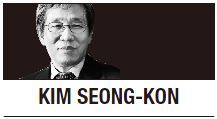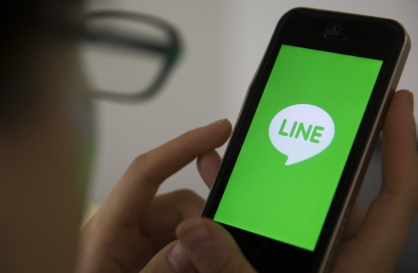 These days, Korea is roasting under the scorching sun. During the day, Koreans seek refuge in air-conditioned buildings and at night, they toss and turn because of the unbearably high temperature and suffocating humidity. People mutter, “Is Korea burning?”
These days, Korea is roasting under the scorching sun. During the day, Koreans seek refuge in air-conditioned buildings and at night, they toss and turn because of the unbearably high temperature and suffocating humidity. People mutter, “Is Korea burning?”The heat is coming not only from above, but from all sides. South Korea is caught in the crossfire between China, Japan, Russia and the United States these days. The leaders of those four nations are all invariably strongmen who have vowed to make their countries great again. In order to accomplish their goals, they seem to believe they need to flex their muscles. Unfortunately, the Korean Peninsula seems to have become a shooting range for them to show off their abilities.
For example, the US wants to deploy the Terminal High Altitude Area Defense system in Korea, whereas China vehemently opposes it and is retaliating through implicit sanctions against Korea. The Japanese political leaders instigate anti-Korean sentiment for political gain, and Russia takes the side of North Korea against the UN’s attempt to impose economic sanctions on it. To make matters worse, North Korea keeps threatening South Korea with its nuclear missiles, ignoring several friendly gestures from the South. Obviously, South Korea is being helplessly exposed to sizzling heat coming from all four directions and gets burned by them these days.
At the same time, however, Koreans are also experiencing sub-zero conditions when it comes to foreign affairs. These days, the Korean people feel that they are frequently left out in the cold in the diplomatic negotiations between China and the US, between Japan and the US, or even between North Korea and the US. Even though the future of South Korea is at stake, there seems to be no place for South Korea in their negotiations. Belatedly, South Koreans are beginning to realize that their destiny depends not only on themselves but on their neighboring countries.
Many South Koreans call for the Peace Treaty these days, not knowing that that they will be passed over in the Peace Treaty as well, if it is even realized, just as they were left out in the Armistice Treaty in 1953. They also do not seem to know that the Peace Treaty will immediately result in the pullout of the US troops from the Korean Peninsula. Some people naively believe that the US Troops will still remain after the Peace Treaty and others, who are ultra-nationalists, secretly wish to see the American troops leave.
In the movie, “Is Paris Burning?” Hitler orders Gen. Dietrich von Choltitz to destroy Paris completely before the Allied Forces take the city. Choltitz disobeys the order and saves invaluable cultural monuments in Paris. Thanks to Choltitz’s discretion, Paris is intact when the allied forces march in. Meanwhile, Hitler calls the empty military headquarters in Paris and keeps yelling over the phone, “Is Paris burning?”
Just like Paris, Seoul, too, should be safe and sound amidst the crossfire of our neighboring countries. We do not want to suffer the heat and get burned from it, whether it is from China, Japan or North Korea. If diplomacy fails and volcanoes erupt in our neighboring countries, the heat will cover South Korea eventually, burning down our invaluable, splendid accomplishments to ashes.
The result will be catastrophic; our miraculous economic success called “The Miracle on the Han River” and all the glorious achievements will be gone with the wind in a flash. We do not deserve it. The sizzling heat from the sun is enough already.
We do not want to be left out in the cold either. Henry Kissinger’s proposition sounds like America is giving up South Korea for the safety of American cities. But Washington should know that North Korea’s ultimate aim is not to strike American cities, but to use it as leverage for political gain. North Korean politicians are well aware that waging war against the States is totally reckless. Presumably, Washington already knows it, but cannot tolerate the threat itself. North Korea’s threats gets on the nerves of the US and hurts its pride.
During the military dictatorship in the 1970s, poet Yang Sung-woo published a monumental book of poems titled, “The Winter Republic.” After reading the title poem in a public place in 1975, Yang was fired from the high school where he taught Korean literature and subsequently found himself in prison. In the poem, the poet depicted his country as a frozen Winter Republic.
Now the dictatorship is over and South Korea is no longer a Winter Republic, per se. However, South Koreans are still left out in the cold in the international community. In that sense, South Korea may still be called a Winter Republic.
Currently, “fire and ice” coexist in South Korea. People are suffering from both unbearable heat and freezing cold at the same time. We are desperately waiting for a nice cool autumn and a balmy spring.
---
By Kim Seong-kon
Kim Seong-kon is a professor emeritus of English at Seoul National University and president of the Literature Translation Institute of Korea. He can be reached at sukim@snu.ac.kr. -- Ed.











![[Weekender] How DDP emerged as an icon of Seoul](http://res.heraldm.com/phpwas/restmb_idxmake.php?idx=644&simg=/content/image/2024/04/25/20240425050915_0.jpg&u=)
![[Today’s K-pop] NewJeans' single teasers release amid intrigue](http://res.heraldm.com/phpwas/restmb_idxmake.php?idx=644&simg=/content/image/2024/04/26/20240426050575_0.jpg&u=)





![[Herald Interview] Mistakes turn into blessings in street performance, director says](http://res.heraldm.com/phpwas/restmb_idxmake.php?idx=652&simg=/content/image/2024/04/28/20240428050150_0.jpg&u=)
